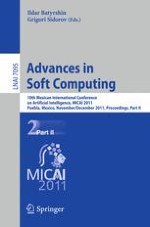2011 | OriginalPaper | Buchkapitel
Clustering of Heterogeneously Typed Data with Soft Computing - A Case Study
verfasst von : Angel Kuri-Morales, Daniel Trejo-Baños, Luis Enrique Cortes-Berrueco
Erschienen in: Advances in Soft Computing
Verlag: Springer Berlin Heidelberg
Aktivieren Sie unsere intelligente Suche, um passende Fachinhalte oder Patente zu finden.
Wählen Sie Textabschnitte aus um mit Künstlicher Intelligenz passenden Patente zu finden. powered by
Markieren Sie Textabschnitte, um KI-gestützt weitere passende Inhalte zu finden. powered by
The problem of finding clusters in arbitrary sets of data has been attempted using different approaches. In most cases, the use of metrics in order to determine the adequateness of the said clusters is assumed. That is, the criteria yielding a measure of quality of the clusters depends on the distance between the elements of each cluster. Typically, one considers a cluster to be adequately characterized if the elements within a cluster are close to one another while, simultaneously, they appear to be far from those of different clusters. This intuitive approach fails if the variables of the elements of a cluster are not amenable to distance measurements, i.e., if the vectors of such elements cannot be quantified. This case arises frequently in real world applications where several variables (if not most of them) correspond to categories. The usual tendency is to assign arbitrary numbers to every category: to encode the categories. This, however, may result in spurious patterns: relationships between the variables which are not really there at the offset. It is evident that there is no truly valid assignment which may ensure a universally valid numerical value to this kind of variables. But there is a strategy which guarantees that the encoding will, in general, not bias the results. In this paper we explore such strategy. We discuss the theoretical foundations of our approach and prove that this is the best strategy in terms of the statistical behavior of the sampled data. We also show that, when applied to a complex real world problem, it allows us to generalize soft computing methods to find the number and characteristics of a set of clusters. We contrast the characteristics of the clusters gotten from the automated method with those of the experts.
